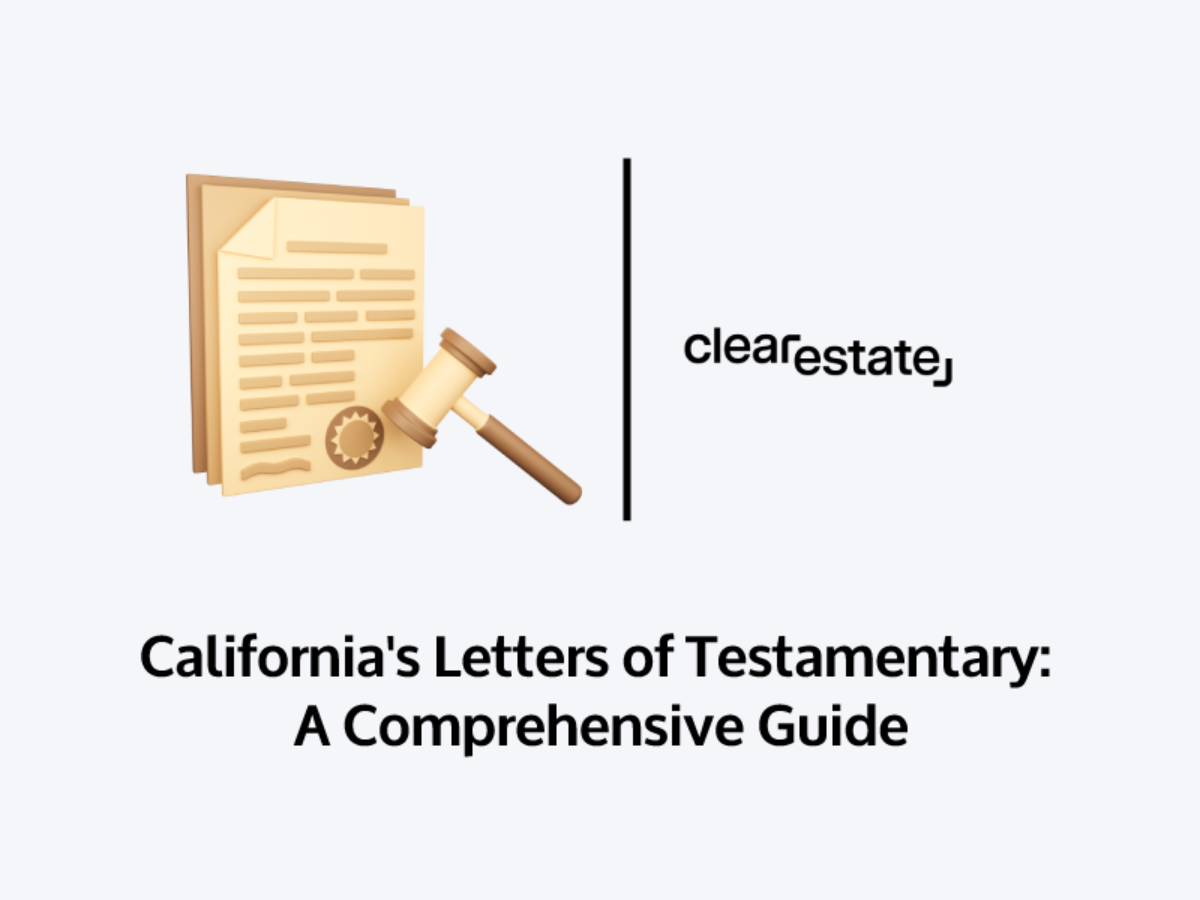Estate Settlement
May 01, 2025
What to Do When Someone Dies in California
Follow this step-by-step guide to navigate legal duties, probate, and estate tasks with clarity and confidence.
Discover the precise steps to secure Letters of Testamentary in California. Our comprehensive guide makes the process straightforward and hassle-free


Article Contents
When a person passes away, their estate - which includes all their financial assets, real estate, and personal belongings - often needs to be managed and eventually distributed according to their will. This task falls to the executor or personal representative, who is typically named in the will.
However, banks, investment companies, and other financial institutions don't just take the executor's word for it.
They need official, legal proof that this person has the legal authority to access the deceased's accounts, sell their property, and distribute their assets. This is where the Letter of Testamentary comes in.
Issued by the Superior Court, after a petition for probate (DE-111) is made - the Letter of Testamentary serves as a formal, legal document (DE-150) that provides the executor or personal representative the legal authority to manage the deceased's estate.
in simple terms, letters of testamentary act like a badge of authority that the executor can present to financial institutions and insurance companies proving they have the right to act on behalf of the estate.
Without this letter, the executor would likely find it impossible to fulfill their duties, as they wouldn't be able to access the deceased's assets or carry out the necessary financial transactions.
Letters of testamentary are typically required when a person has passed away and has left behind assets that need to be distributed as per their will.
An executor, named in the will, is responsible for carrying out these tasks.
The Letters Testamentary provide the executor with the authority to deal with the deceased's assets, pay off any debts, and distribute the remaining estate to the beneficiaries.
Not all situations demand the issuance of these letters. In California, there is a concept known as a "small estate," which can simplify the process.
A small estate refers to:
an estate of a decedent who died Before April 1,2022 total value is $166,250 or less
OR
for an estate of a decedent who died AFTER April 1,2022 total value is $184,500
For such estates; a more straightforward "small estate probate procedure" is available, allowing estate property transfer - without the lengthy and expensive formal probate process.
This means; if a deceased person's estate falls under the definition of a 'small estate,' Letters Testamentary might not be necessary.
Ensure you obtain a copy of the Letters of Testamentary for each financial institution the deceased was involved with. Each company will require this document to verify your authority to manage the estate's assets.
If the decedent died intestate, you cannot obtain a Letter of Testamentary.
However, the deceased’s next of kin can apply to receive a Letter of Administration, which is granted to a court-appointed estate administrator. This person fulfills the same role as an estate executor would.
Navigating the distinction between Letters Testamentary and Letters of Administration hinges primarily on if there is a will or not.
In the case that a will exists and has designated an executor, it is incumbent upon this person to apply for Letters Testamentary.
Conversely, should there be an absence of a will, or in the event that the chosen executor cannot fulfill their duties, court intervention becomes necessary.
The court will either designate an administrator or allow an eligible individual from a predefined priority list (usually a next of kin or close relative) to apply for the administrator role.
For those circumstances where a will does not exist, the individual who has been appointed or is applying for the administrator position will be responsible for obtaining Letters of Administration.
If you are an estate executor or a personal representative currently struggling to navigate the probate process - don’t hesitate to speak to our experienced experts at ClearEstate.
Reach out today for a free consultation - in this free consultation, our experts will guide you through the probate process and help clear things up for you in your time of need.
Contrary to common belief, the administration of a Trust does not necessitate the use of Letters of Testamentary. The beauty of a Trust is that it bypasses the probate process entirely, removing the need for court involvement. These are significant benefits of setting up a Trust.
Typically, when it comes to Trust administration, all that's required is the presentation of the trust instrument or trust certification when requested. This simplifies the process and further underscores the advantages of Trusts.
Technically, in California - you are not required to have an attorney at all during probate, unless the probate case is undergoing litigation.
However, seeking professional help can greatly reduce the problems that can come along with the intricacies of the probate process. Something as simple as a wrongly filled out DE-111 can prolong the process even further.
 Simplify Probate Today
Simplify Probate Today
Get expert guidance from our specialists who've helped 10,000+ families.
Book a free consultation